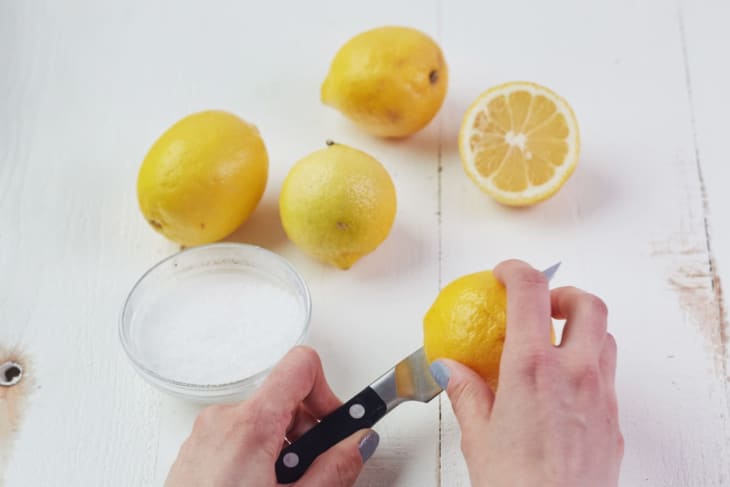Use This Trick to Eliminate Rusty Spots on Your Knives
I’m always surprised by how finicky knives are. You’d think that a blade that can slice right through meat or cleave a squash in two would be pretty much impervious to any kind of wear! But if you — like me — have a habit of neglecting your knives, they can dull and rust pretty quickly. And sadly, rust is a frequent visitor in my kitchen. That is not OK, considering a good knife can cost more than $100!
“Rust appears on knives when they sit in a soapy sink, go through the dishwasher, or aren’t dried right away,” says Becky Rapinchuk, the blogger behind Clean Mama and author of Simply Clean. I’m guilty of doing all of those things to my knives — and the rest of my silverware and dishware. (Although I am also not buying $100 knives.)
Because knives are usually made mostly from steel, anytime you leave water on them for longer than absolutely necessary, they start to corrode. Do it enough times, and those worrisome spots will start to appear. While rust spots aren’t particularly harmful to your health — you’d have to eat a lot of rust before that would happen — they can affect the performance of your knives and can grow over time if you don’t address them.
It’s tempting to take your go-to commercial cleaner and a scouring pad to the knives, but that’s not the best idea! “I wouldn’t use any cleaner that’s not food-safe and specifically labeled as non-toxic,” says Rapinchuk.
Lemon juice is the food-safe answer to rusty knives.
Fortunately, there’s an easy, food-safe solution: “Lemon juice is a great way to safely remove rust from kitchen knives,” says Rapinchuk. Simply cut a lemon and rub it along the blade, then carefully rub the blade with a soft cloth or sponge until the spots disappear. If you need a little extra cleaning power, dip the lemon in some sea salt and scrub again. Once the rust spots are gone, wash the knife with dish soap and dry it right away.
To prevent future rust spots on your knives, here’s what Rapinchuk recommends:
- Always clean knives right after using them.
- For best results, hand-wash your knives with dish soap, then dry them right away.
- Never put your knives in the dishwasher.
- Don’t soak your knives in the sink or let them stand in water.
“As long as you wash correctly and dry immediately, you should be good,” says Rapinchuk. But if your knife is bent beyond repair, can’t be sharpened, or if the rust just can’t be removed — even after rubbing with lemon and vigorous scrubbing — it’s time to throw it away.
